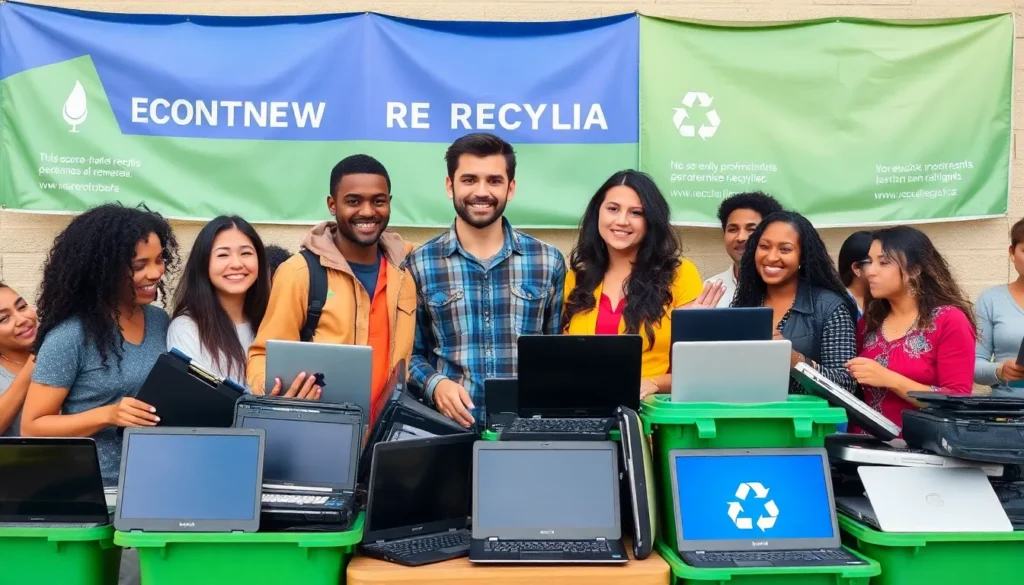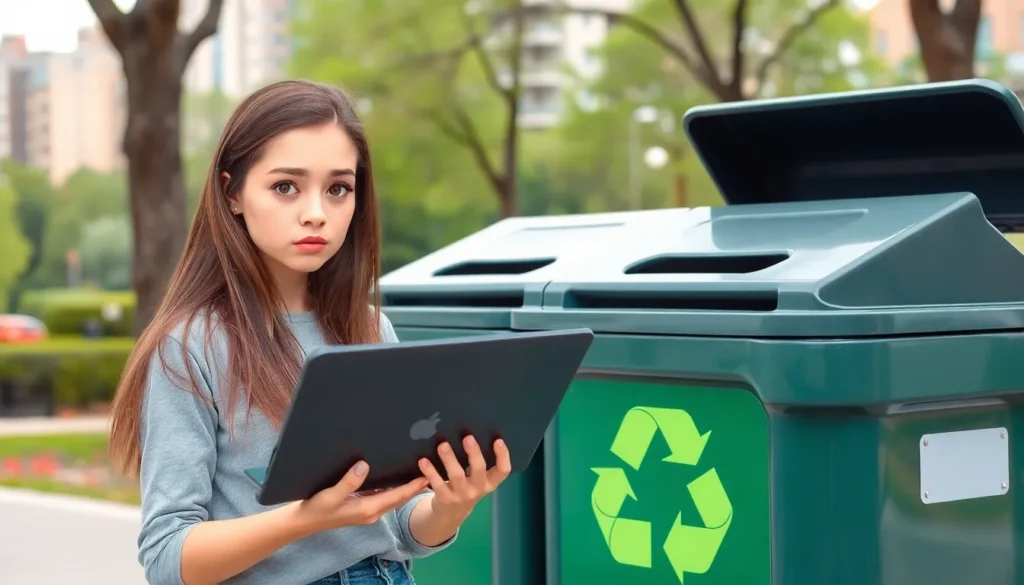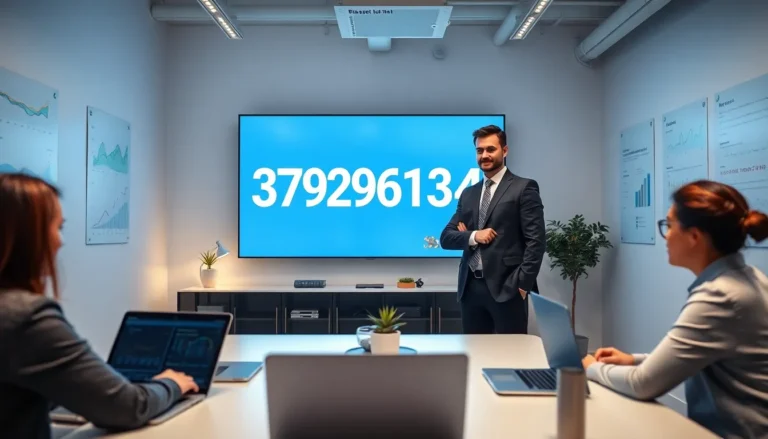Table of Contents
ToggleOld laptops can feel like that awkward ex who just won’t leave. They take up space, collect dust, and remind you of all those late-night Netflix binges. But before tossing that relic into the trash, it’s time to consider a smarter, greener way to say goodbye. Disposing of old laptops isn’t just about clearing clutter; it’s about doing right by the planet and your data.
Understanding The Importance Of Proper Disposal
Proper disposal of old laptops significantly reduces electronic waste, which can harm the environment. In 2021, over 50 million metric tons of e-waste generated globally demonstrated the urgency for responsible disposal methods. Many components in laptops, such as batteries and circuit boards, contain toxic materials that require careful handling. Neglecting this responsibility can lead to soil and water contamination, further impacting ecosystems.
Data security poses another critical concern. Laptops can harbor sensitive information, and improper disposal may result in identity theft or data breaches. Ensuring data is permanently erased before disposal minimizes risks to personal and organizational security. Techniques like using data-wiping software or physically destroying hard drives guarantee that information remains confidential.
Recycling plays a vital role in reducing the environmental impact of old laptops. Many manufacturers accept returned devices or have partnerships with certified e-waste recyclers. These organizations responsibly recycle components, recapture valuable materials, and lower the demand for new raw materials.
Finding certified recycling facilities encourages proper disposal practices. Many local municipalities provide drop-off bins or host events that facilitate e-waste recycling. Taking advantage of these options not only helps declutter personal spaces but also contributes to a healthier planet.
Recognizing the significance of responsible disposal fosters a culture of sustainability. Individuals and businesses can promote environmental awareness by sharing information about proper disposal methods. Adopting these practices prevents the accumulation of e-waste while protecting the environment and securing sensitive data.
Local Recycling Options

Finding local recycling options for old laptops significantly contributes to environmental preservation. Various avenues exist that encourage responsible disposal practices.
Electronic Waste Recycling Centers
Electronic waste recycling centers specialize in handling e-waste responsibly. Many centers provide convenient drop-off locations for old laptops, ensuring safe processing of toxic materials. Certified e-waste recyclers follow strict regulations and standards, minimizing the risk of environmental contamination. Some facilities even offer free recycling services, making it easy for individuals to recycle their devices. By utilizing such centers, he or she can ensure that harmful substances like lead and mercury are managed properly.
Municipal Recycling Programs
Municipal recycling programs often include e-waste disposal in their regular services. Cities and towns may organize periodic e-waste collection events, encouraging community participation. Residents should check local guidelines for specific recycling days or designated drop-off locations. Many municipalities partner with certified recyclers to guarantee safe and ethical processing of electronic devices. Utilizing these programs helps reduce the overall amount of electronic waste, aligning local efforts with broader sustainability goals.
Donation And Reuse Opportunities
Exploring donation and reuse opportunities can give old laptops a new life while benefiting those in need. Numerous organizations accept these devices, ensuring they are repurposed effectively.
Charities And Nonprofits
Charities and nonprofits often welcome donations of operational laptops. Local shelters and community centers frequently seek technology to empower individuals. Organizations like Goodwill and Computers for Humanity refurbish devices for low-income families. Donating ensures that someone else can gain access to valuable technology while supporting education or job readiness programs. Additionally, many nonprofits offer tax deductions for contributions, making donations financially beneficial.
Schools And Educational Institutions
Schools and educational institutions also appreciate donations of used laptops. Many students lack access to necessary technology, particularly in underfunded districts. By donating laptops, individuals can help bridge the digital divide and enhance educational opportunities. Institutions may refurbish devices for classroom use or distribute them to students for homework and research. Partnerships with local schools can lead to initiatives that stimulate learning and improve overall student outcomes. Each laptop donated contributes to equipping future generations with essential skills.
Securing Your Data Before Disposal
Ensuring data security is crucial before disposing of old laptops. Sensitive information stored on devices can lead to identity theft if not adequately handled.
Data Wiping Techniques
Data wiping software effectively removes all data from hard drives. Programs such as DBAN or Eraser permanently overwrite existing data. These methods ensure no recoverable information remains on the device. A full wipe generally takes several hours, depending on the size of the disk. Perform multiple overwrites for added security, as this practice makes recovery nearly impossible.
Physical Destruction Methods
Physical destruction guarantees data safety beyond software wiping. Options include using a hammer or drill to destroy the hard drive. Devices like shredders specifically designed for hard drives also work well. Crushing or shredding effectively prevents data recovery efforts. Following destruction, recyclers can responsibly manage the remnants, ensuring no hazardous materials impact the environment.
Selling Your Old Laptop
Selling an old laptop provides a practical solution for decluttering while earning extra cash. Numerous online platforms facilitate this process, including eBay, Craigslist, and Facebook Marketplace. Each platform offers a different audience and approach, catering to various selling preferences.
Determine the laptop’s condition before listing. Operational models command higher prices than non-functional ones. Additionally, gathering details like specifications, brand, and model year helps set an appropriate price. Providing clear, high-quality images attracts potential buyers and enhances the listing’s credibility.
Evaluate multiple selling options. Some companies, such as Gazelle and Decluttr, offer instant quotes for devices. These services simplify the selling process by handling shipping and payment logistics. Alternatively, local electronic stores may purchase old laptops directly, presenting another convenient avenue for sellers.
Engage with prospective buyers promptly. Responding to inquiries quickly fosters trust and increases the likelihood of a sale. Furthermore, being transparent about the laptop’s history and condition builds credibility.
Consider the payment method before finalizing any sale. Cash transactions provide immediate payment, while platforms like PayPal offer security for both parties. Ensure the sale is secure by meeting in a public place if conducting in-person exchanges.
Prioritize data security during the selling process. Wipe personal information thoroughly to eliminate any risks associated with data breaches. Using data-wiping software ensures sensitive files are inaccessible to the next owner.
Selling an old laptop not only benefits the seller but also promotes sustainability by extending the device’s lifecycle. Many consumers seek affordable technology options, turning old laptops into valuable resources for others.
Disposing of old laptops responsibly is essential for both personal security and environmental sustainability. By choosing to recycle donate or sell these devices individuals can make a positive impact while decluttering their spaces. Engaging with certified e-waste recyclers ensures that harmful materials are handled safely and sensitive data is protected.
Whether it’s through local recycling events or donating to charities that support underserved communities every action contributes to a more sustainable future. Embracing these practices not only helps reduce electronic waste but also fosters a culture of responsibility and awareness. Taking the right steps today can lead to a cleaner environment and a brighter tomorrow.





